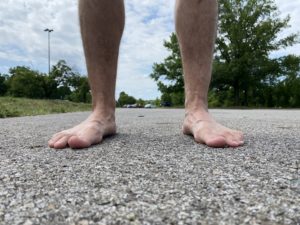Greatest Risk Factors for Stress Fractures in Runners and What To Do About Them:
Too Fast, Too Quickly
When you add in speed training too quickly or increase your speed overall, it can be too fast for your bones to adapt.
Most often, runners with a bone stress injury will present with pain 3-4 weeks after a major training error.
If you have some big goals this year, make sure that you are listening to your coach, following a good quality training plan, or at least building volume first, then slow, careful, brief periods of faster training.
If you have any symptoms, get in now for an assessment and possible treatment including gait retraining to decrease the bone stress to continue running.
Change Up Your Training
Do you run year-round without changing up your training?
Our bones actually get desensitized to the stress of running over time. This makes it so that running isn’t enough input for them to stay strong.
Some things that you can start doing this year to prevent bone stress injuries / stress fractures is:
🏃🏾 periodize your training
🏃🏼♀️ add in plyometics
🏋️♀️ add in high load training
😴 add in periods of rest after high load and training volume
Prevent in Childhood
Preventing stress fractures can start when children begin their first sports.
Before puberty it is very important for children:
to play many different sports
🥍NOT to specialize Or play the same sport year-round
🎾 Involve sports with quick stopping and starting and sprinting
All of this helps to build more bone which will prevent bone stress injuries later in life. I know many of us have a tendency to let our kids play the sport they are most interested in year-round (or eh-hem the sport we want them to play 😄) but it’s really important to change things up to keep them healthy.
Are You Eating ENOUGH?
Preventing stress fractures also requires monitoring of energy deficiency or RED-S.
RED-S stands for relative energy deficiency in sport.
By monitoring for intentional and non-intentional under consumption of calories which can include poor eating habits and also too intensive exercise, we can help prevent stress fractures.
This under- consumption of calories for activity level can show up in symptoms that include (but not limited to):
🏃♂️Gastrointestinal problems
🏃🏾♀️Amenorrhea in females
🏃🏼♀️muscle cramps, weakness
🏃🏾cardiac abnormalities- low HR, abnormal changes in HR and blood pressure during position changes …and stress fractures (sometimes it’s the first noticeable sign of a problem to runners)
Do you pay attention to eating ENOUGH calories for your activity levels?

